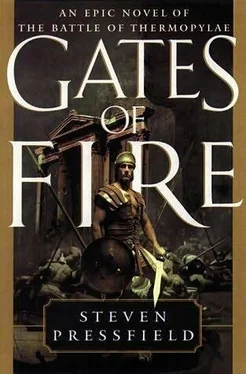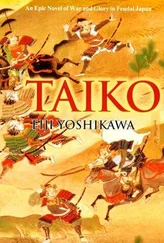Steven Pressfield - Gates of Fire - An Epic Novel of the Battle of Thermopylae
Здесь есть возможность читать онлайн «Steven Pressfield - Gates of Fire - An Epic Novel of the Battle of Thermopylae» весь текст электронной книги совершенно бесплатно (целиком полную версию без сокращений). В некоторых случаях можно слушать аудио, скачать через торрент в формате fb2 и присутствует краткое содержание. Жанр: Историческая проза, на английском языке. Описание произведения, (предисловие) а так же отзывы посетителей доступны на портале библиотеки ЛибКат.
- Название:Gates of Fire: An Epic Novel of the Battle of Thermopylae
- Автор:
- Жанр:
- Год:неизвестен
- ISBN:нет данных
- Рейтинг книги:3 / 5. Голосов: 1
-
Избранное:Добавить в избранное
- Отзывы:
-
Ваша оценка:
- 60
- 1
- 2
- 3
- 4
- 5
Gates of Fire: An Epic Novel of the Battle of Thermopylae: краткое содержание, описание и аннотация
Предлагаем к чтению аннотацию, описание, краткое содержание или предисловие (зависит от того, что написал сам автор книги «Gates of Fire: An Epic Novel of the Battle of Thermopylae»). Если вы не нашли необходимую информацию о книге — напишите в комментариях, мы постараемся отыскать её.
Gates of Fire: An Epic Novel of the Battle of Thermopylae — читать онлайн бесплатно полную книгу (весь текст) целиком
Ниже представлен текст книги, разбитый по страницам. Система сохранения места последней прочитанной страницы, позволяет с удобством читать онлайн бесплатно книгу «Gates of Fire: An Epic Novel of the Battle of Thermopylae», без необходимости каждый раз заново искать на чём Вы остановились. Поставьте закладку, и сможете в любой момент перейти на страницу, на которой закончили чтение.
Интервал:
Закладка:
My own suspicion was that the runner's animus was inflamed further by the favor Alexandros had found in Dienekes' eyes. For of all the men in the city with whom Polynikes competed in virtue and excellence, he resented most my master. Not so much for the honors Dienekes had been granted by his peers in battle, for Polynikes, like my master, had been awarded the prize of valor twice, and he was ten or twelve years younger.
It was something else, some less obvious aspect of character which Dienekes possessed and which the city honored him by recognizing, instinctively, without prompting or ceremony.
Polynikes saw it in the way the young boys and girls joked with Dienekes when he passed their sphairopaedia, the ball-playing fields, during the noonday break. He caught it in the tilt of a smile from a matron and her maids at the springs or an old woman passing in the square. Even the helots granted my master a fondness and respect that were withheld from Polynikes, for all the heaps of honors that were his in other quarters. It galled him. Mystified him. He, Polynikes, had even produced two sons, while Dienekes' issue were all female, four daughters who, unless Arete could produce a son, would extinguish his line altogether, while Polynikes' strapping swift lads would one day be warriors and men. That Dienekes wore the respect of the city so lightly and with such self-effacing wit was even more bitter to Polynikes.
For the runner saw in Dienekes neither beauty of form nor fleetness of foot. Instead he perceived a quality of mind, a power of self-possession, which he himself, for all the gifts the gods had lavished upon him, could not call his own. Polynikes' courage was that of a lion or an eagle, something in the blood and the marrow, which summoned itself out of its own preeminence, without thought, and gloried in its instinctual supremacy.
Dienekes' courage was different. His was the virtue of a man, a fallible mortal, who brought valor forth out of the understanding of his heart, by the force of some inner integrity which was unknown to Polynikes. Was this why he hated Alexandros? Was it why he had splintered the boy's nose that evening of the eight-nighter? Polynikes sought to break more than the youth's face now. Here in the mess he wanted to crack him, to see him come apart.
You look unhappy, pais. As if the prospect of battle held for you no promise of joy.
Polynikes ordered Alexandras to recite the pleasures of war, to which the boy responded by rote, citing the satisfactions of shared hardship, of triumph over adversity, of camaraderie and Philadelphia, love of one's comrades-in-arms.
Polynikes frowned. Do you feel pleasure when you sing, boy?
Yes, lord.
And when you flirt around with that trollop Agathe?
Yes, lord.
Then imagine the pleasure that awaits you, when you clash in line of battle, shield-to-shield with an enemy burning to kill you, and you instead slay him. Can you imagine that ecstasy, you little shitworm?
The pais is trying, lord.
Let me assist you. Close your eyes and picture it. Obey me!
Polynikes was keenly aware of the torment this was causing Dienekes, who held himself controlled and impassive upon his bare couch, just two places down.
To plunge a spear, blade-deep, into a man's guts is like fucking, only better. You like to fuck, don't you?
The boy doesn't know, lord.
Don't toy with me, you twittering sparrow.
Alexandras, on his feet for an hour by this time, had steeled himself utterly. He answered his tormentor's questions, frozen at attention, eyes riveted to the dirt, ready in his guts to endure anything.
Killing a man is like fucking, boy, only instead of giving life you take it. You experience the ecstasy of penetration as your warhead enters the enemy's belly and the shaft follows. You see the whites of his eyes roll inside the sockets of his helmet. You feel his knees give way beneath him and the weight of his faltering flesh draw down the point of your spear. Are you picturing this?
Yes, lord.
Is your dick hard yet?
No, lord.
What? You've got your spear in a man's guts and your dog isn't stiff? What are you, a woman?
At this point the Peers of the mess began rapping their knuckles upon the hardwood, an indication that Polynikes' instruction was going too far. The runner ignored this.
Now picture with me, boy. You feel the foe's beating heart upon your iron and you rip it forth, twisting as you pull. A sensation of joy surges up the ash of your spear, through your hand and along your arm up into your heart. Are you enjoying this yet?
No, lord.
You feel like God at that moment, exercising the right only He and the warrior in combat may experience: that of dealing death, of loosing another man's soul and sending it down to hell. You want to savor it, to twist the blade deeper and pull the man's heart and guts out upon the iron point of your spear, but you can't. Tell me why.
Because I must move on and slay the next man.
Are you going to weep now?
No, lord.
What will you do when the Persians come?
Slay them, lord.
What if you stand on my right in line of battle? Will your shield protect me?
Yes, lord.
What if I advance, defended by the shadow of your shield? Will you hold it high at port before me?
Yes, lord.
Will you bring down your man?
I will.
And the next?
Yes.
I don't believe you.
At this the Peers rapped more vigorously with their knuckles upon the tables. Dienekes spoke.
This is no longer instruction, Polynikes. This is malice.
Is it? the runner answered, not deigning to look in the direction of his rival. We'll inquire of its object. Have you had enough, you psalm-singing wad of shit?
No, lord. The boy begs the Peer to continue.
Dienekes stepped in. Gently, with compassion, he addressed the youth, his protege. Why do you tell the truth, Alexandras? You could lie, like every other boy, and swear you reveled in the witnessing of slaughter, you savored the sight of limbs cleaved and men maimed and murdered within the jaws of war.
I thought of that, lord. But the company would see through me.
You're fucking right we would, confirmed Polynikes. He heard the anger in his own voice and brought it swiftly under control. However, out of deference to my esteemed comrade-here he turned with a mock-courteous bow to Dienekes-I will address my next question not to this child, but to the mess as a whole. He paused, then indicated the boy at attention before them.
Who will stand with this woman on his right in the line of battle?
I will, Dienekes answered without hesitation.
Polynikes snorted.
Your mentor seeks to shield you, paidarion. In the pride of his own prowess he imagines he may fight for two. This is recklessness. The city cannot risk his loss, because he has eyes for the comeliness of your girlish face.
Enough, my friend. This from Medon, senior of the mess. The Peers seconded with a chorus of knuckle raps.
Polynikes smiled. I accede to your chastisement, gentlemen and elders. Please excuse my excess of zeal. I seek only to impart to our youthful comrade some insight into the nature of reality, the state of man as the gods have made him. May I conclude his instruction?
With brevity, Medon admonished.
Polynikes turned again to Alexandras. When he resumed now, his voice was gentle and without malice; if anything it seemed informed with something not unlike kindness and even, odd as it sounds, sorrow.
Mankind as it is constituted, Polynikes said, is a boil and a canker. Observe the specimens in any nation other than Lakedaemon. Man is weak, greedy, craven, lustful, prey to every species of vice and depravity. He will lie, steal, cheat, murder, melt down the very statues of the gods and coin their gold as money for whores. This is man. This is his nature, as all the poets attest.
Читать дальшеИнтервал:
Закладка:
Похожие книги на «Gates of Fire: An Epic Novel of the Battle of Thermopylae»
Представляем Вашему вниманию похожие книги на «Gates of Fire: An Epic Novel of the Battle of Thermopylae» списком для выбора. Мы отобрали схожую по названию и смыслу литературу в надежде предоставить читателям больше вариантов отыскать новые, интересные, ещё непрочитанные произведения.
Обсуждение, отзывы о книге «Gates of Fire: An Epic Novel of the Battle of Thermopylae» и просто собственные мнения читателей. Оставьте ваши комментарии, напишите, что Вы думаете о произведении, его смысле или главных героях. Укажите что конкретно понравилось, а что нет, и почему Вы так считаете.












